
Interdisciplinary Studies of Complex Systems
Scope & Guideline
Advancing Knowledge in the Dynamics of Complex Systems
Introduction
Aims and Scopes
- Interdisciplinary Research:
The journal encourages contributions that bridge gaps between traditional academic disciplines, promoting a comprehensive understanding of complex systems through collaborative approaches. - Cultural and Social Dynamics:
A significant focus is placed on the cultural and social aspects of complex systems, examining how identity, community, and socio-political factors influence and are influenced by systemic interactions. - Technological Integration:
Research that explores the role of technology in shaping complex systems, including digital transformation in education and economy, is prominently featured, highlighting the evolving nature of these interactions. - Methodological Innovation:
The journal emphasizes novel methodological approaches, including mathematical modeling and systemic analysis, to better understand and predict behaviors within complex systems. - Sustainability and Policy Impact:
There is a strong emphasis on research that addresses sustainability challenges and informs policy decisions, particularly in the context of socio-political stability and environmental issues.
Trending and Emerging
- Digital Transformation and Education:
There is a growing emphasis on digital transformation within education, exploring how technological advancements are reshaping learning environments and educational practices. - Socio-Political Stability and Information Security:
Research addressing the intersection of socio-political dynamics and information security, particularly in contexts of conflict and instability, has gained traction, reflecting contemporary global concerns. - Sustainability and Environmental Issues:
Emerging themes around sustainability, particularly in relation to biopower and climate change adaptation, indicate a heightened awareness of environmental challenges within complex systems. - Transhumanism and Future Paradigms:
The exploration of transhumanism and its implications for society is on the rise, suggesting a burgeoning interest in how technological advancements may redefine human existence and societal structures. - Interdisciplinary Approaches to Identity:
An increase in interdisciplinary studies that examine identity through various lenses—cultural, social, and psychological—reflects a nuanced understanding of identity's complexity in modern society.
Declining or Waning
- Historical Analysis and Cultural Heritage:
Papers focusing on historical analysis and cultural heritage, while still relevant, have decreased in frequency. This may indicate a shift towards more contemporary issues and applications of complex systems. - Traditional Educational Models:
Research centered on traditional educational methodologies appears to be waning, as the journal increasingly prioritizes innovative approaches and the impact of digital transformation on education. - Narrowly Focused Ethnic Studies:
Studies that concentrate solely on ethnic identity without a broader systemic context are becoming less common, suggesting a shift towards more integrated approaches that consider multiple factors influencing identity.
Similar Journals
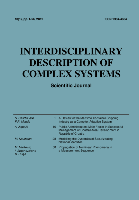
Interdisciplinary Description of Complex Systems
Advancing Understanding Through Interdisciplinary CollaborationInterdisciplinary Description of Complex Systems is a prominent academic journal dedicated to the exploration and understanding of complex systems, published by the CROATIAN INTERDISCIPLINARY SOC. Since its inception in 2003, this journal has embraced an Open Access model, facilitating the widespread dissemination of research within a diverse range of disciplines intersecting with complex systems theory. The journal spans fields including mathematics, engineering, natural and social sciences, making it a vital resource for researchers, professionals, and students eager to explore interconnected systems in a global context. With its rigorous peer-review process and commitment to innovation, Interdisciplinary Description of Complex Systems stands as a significant contributor to advancing knowledge, encouraging interdisciplinary collaboration, and fostering new insights into complex phenomena. The journal’s dedication to open access ensures that valuable research is freely available, promoting global participation in the scholarly dialogue.
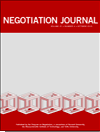
NEGOTIATION JOURNAL
Navigating the Complexities of Negotiation.Negotiation Journal, published by Wiley, has been a pivotal platform since its inception in 1985, providing insights into the multifaceted domain of negotiation and conflict resolution. With its ISSN 0748-4526 and E-ISSN 1571-9979, this journal focuses on the intricate dynamics encountered in negotiation processes across various fields, making it essential reading for researchers, professionals, and students alike. With a notable 2023 impact factor and quartile rankings of Q2 in Social Sciences and Q3 in Management of Technology and Innovation, the journal positions itself as a key contributor to both academic discourse and practical applications in negotiation strategies. Although it currently does not offer open access, the journal’s comprehensive blend of theoretical research and empirical studies enhances its relevance in today’s complex societal interactions. Researchers can look forward to contributing to and benefiting from a repository of knowledge, aimed at advancing the understanding of negotiation behavior and outcomes.
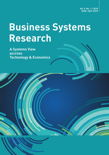
Business Systems Research Journal
Connecting Ideas, Driving Change in Business ResearchBusiness Systems Research Journal (ISSN: 1847-8344; E-ISSN: 1847-9375) is a distinguished academic publication, launched by SCIENDO, that has been a vital platform for research discourse in the fields of business, economics, and information systems since its transition to an Open Access model in 2010. Based in Poland, this journal serves as a nexus for innovative methodologies and theoretical frameworks that address contemporary challenges in economic systems, management information systems, and technology innovation. With its recent ranking in the Q2 tier in Economics, Econometrics, and Finance (miscellaneous) alongside Q3 rankings in key related areas, the journal is recognized for its quality contributions and emerging influence, as evidenced by its standings in Scopus and category quartiles. As a valuable resource for researchers, professionals, and students alike, the Business Systems Research Journal aims to foster collaboration and knowledge sharing that drive advancement and insight within a rapidly evolving global market.

Journal of Integrative Environmental Sciences
Innovating pathways to tackle pressing environmental challenges.Journal of Integrative Environmental Sciences, published by Taylor & Francis Ltd, stands as a pivotal platform for researchers and professionals in the fields of Environmental Science and Public Health. With an impact factor reflecting its significance in the academic community, this Open Access journal has been democratizing access to cutting-edge research since 2016, enhancing visibility and dissemination of vital insights. The journal covers a wide scope, converging studies from 2010 to 2024, and holds esteemed rankings in Q2 quartiles for Environmental Science and Public Health, indicating its substantial contribution to these critical fields. With Scopus rankings placing it favorably among its peers, researchers benefit from a diverse array of articles addressing pressing environmental and health issues, sustainability, and renewable energy. As an essential resource for advancing knowledge and fostering innovation, the Journal of Integrative Environmental Sciences encourages contributions that span interdisciplinary approaches to solving some of the most challenging environmental dilemmas of our time.

Complex Systems
Advancing Knowledge in Complex Systems ScienceComplex Systems is a pivotal journal published by Complex Systems Publications Inc, specializing in the interdisciplinary field of complex systems science. With an ISSN of 0891-2513, it focuses on advancing the understanding of complex phenomena across various domains, including computer science and control engineering. Operating from the United States, this journal has established itself as a credible source with a current impact factor reflecting its relevance—ranking in the Q3 category for both Computer Science (miscellaneous) and Control and Systems Engineering as of 2023. Although it does not offer Open Access, Complex Systems aims to facilitate the exchange of cutting-edge research and innovative methodologies, making it indispensable for researchers, professionals, and students eager to explore and contribute to the field. With coverage spanning from 2012 to 2024, it strives to foster a deeper understanding of the principles governing complex systems, thus paving the way for future technological advancements and theoretical developments.
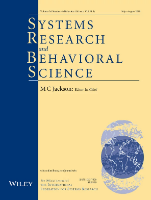
SYSTEMS RESEARCH AND BEHAVIORAL SCIENCE
Bridging disciplines to illuminate complex systems.SYSTEMS RESEARCH AND BEHAVIORAL SCIENCE, published by Wiley, is a premier academic journal that bridges the fields of information systems, management, and behavioral science. This journal boasts an impressive impact factor, reflecting its commitment to high-quality research and its vital role in advancing theoretical and applied knowledge. Ranking in the second quartile for Information Systems and Management and the first quartile for Social Sciences (miscellaneous) as of 2023, it is recognized for its significant contribution to understanding complex social and organizational systems. The journal operates with open access options, promoting the dissemination of research findings to a wider audience. With a convergence period spanning from 1996 to 2024, SYSTEMS RESEARCH AND BEHAVIORAL SCIENCE provides a platform for innovative research that informs practices in social sciences and decision-making processes. Its high rankings within Scopus under various categories further attest to its relevance and impact in shaping contemporary thought within academia and practice, making it an essential resource for researchers, professionals, and students alike.

Systems
Unleashing the Power of Open Access Research in SystemsSystems is an esteemed, peer-reviewed academic journal published by MDPI, focusing on the multifaceted fields of Computer Networks and Communications, Control and Systems Engineering, Information Systems and Management, Modeling and Simulation, and Software. Since its inception in 2013, this Open Access journal strives to disseminate high-quality research that addresses contemporary challenges in system design, analysis, and management across various disciplines. With a dynamic impact factor emerging from its Q3 ranking in several categories and notable Scopus rankings, *Systems* offers a valuable platform for academics, researchers, and industry professionals to share innovative ideas and solutions. Operating from its base in Basel, Switzerland, the journal facilitates unrestricted access to its content, ensuring that pivotal research remains available to a global audience. By fostering collaboration and knowledge exchange, *Systems* plays a crucial role in advancing the theory and application of systems thinking in today’s complex technological landscape.

JASSS-THE JOURNAL OF ARTIFICIAL SOCIETIES AND SOCIAL SIMULATION
Exploring the Dynamics of Artificial SocietiesJASSS - The Journal of Artificial Societies and Social Simulation, published by J A S S S, is a pioneering Open Access journal that has been at the forefront of interdisciplinary research since 1998. Focused on the interplay between artificial societies and social simulation, this journal fosters innovative research that bridges the gap between social sciences and computer science. With an impressive Impact Factor and a distinguished ranking, Q1 in both Computer Science (miscellaneous) and Social Sciences (miscellaneous), JASSS remains an essential resource for researchers, professionals, and students eager to explore the complexities of social dynamics through computational models. The journal is now accessible online, providing a platform for the dissemination of groundbreaking studies from its address at the University of Surrey, where it continues to contribute to the advancement of knowledge up to the present day. With a Scopus ranking placing it in the top 95th percentile among General Social Sciences and 89th percentile among Computer Science fields, JASSS is vital for anyone interested in understanding the simulated environments of social phenomena.

Journal of Physics-Complexity
Exploring the Intricacies of Complexity ScienceThe Journal of Physics-Complexity, published by IOP Publishing Ltd, is a premier open access journal that has been making significant strides in the fields of Artificial Intelligence, Computer Networks and Communications, Computer Science Applications, and Information Systems since its establishment in 2020. Operating from the United Kingdom, this journal aims to foster interdisciplinary research that bridges theoretical and applied aspects of complexity science. With an admirable Q2 ranking in four prestigious categories and a Scopus ranking indicating it holds a solid position within its fields, this journal caters to a diverse audience of researchers, professionals, and students eager to explore the intricacies of complex systems. Its open access model ensures that groundbreaking research is readily available to the global community, thereby enhancing the dissemination of knowledge and information. As it converges towards 2024, the Journal of Physics-Complexity is poised to expand its influence, inviting innovative contributions that challenge conventional thinking and push the boundaries of scientific discovery.
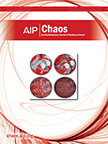
CHAOS
Innovating Theories for a Chaotic WorldCHAOS, an esteemed journal published by AIP Publishing, is a cornerstone of interdisciplinary research, focusing on the intricate dynamics of complex systems across various scientific domains. With a balanced impact factor, this journal emphasizes high-quality contributions in Applied Mathematics, Mathematical Physics, and Statistical and Nonlinear Physics, while also exploring intersections with Medicine and Physics and Astronomy. With rankings showing a remarkable percentile placement, notably #7 in Mathematical Physics and #10 in Statistical and Nonlinear Physics, CHAOS has established itself as a leading platform for disseminating groundbreaking research since its inception in 1991. This journal not only aims to foster collaboration among scientists but also to advance theoretical and computational frameworks that unravel the complexities of chaotic systems. Researchers, professionals, and students alike will find rich insights and innovative theories within its pages, making it an invaluable resource in the pursuit of knowledge and understanding in the modern scientific landscape.